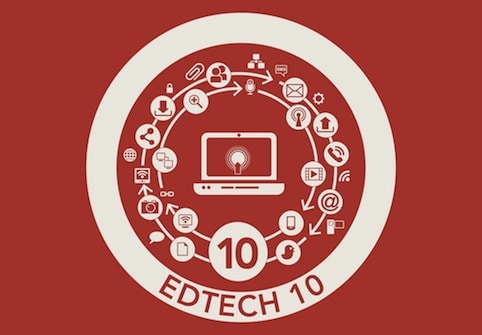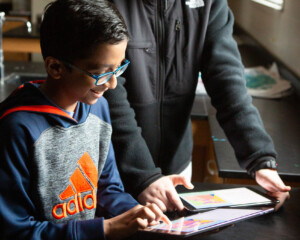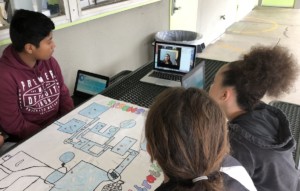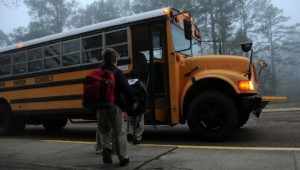EdTech 10: Dog Days of Summer

Its hot and we’re not just talking about the heat either. Its been a jam packed summer as education news is heating up around the country. As store shelves slowly replace BBQ equipment and sunscreen with backpacks and school supplies we’re bringing you the top EdTech news of the week to cool you off.
Blended Schools & Tools
1. Office to School. NGLC (@NexGenLC) released a new brief Next Gen Tools: Blended Learning Classroom Design that describes the conversion of Merit Prep, Matchbook Learning‘s first blended high school, from a former office building to a next-gen learning space. The brief is a great example of reorienting the educational experience around students. (See Smart Cities: Detroit for a recap of Matchbook’s great elementary turnaround work.)
Digital Developments
2. Getting Bigger and Better. Several companies and organizations announced exciting new features, partnerships and functionality this week.
- More students will have access to personalized learning paths through a partnership that integrates Renaissance Learning’s (@RenLearnUS) STAR reading and math data with a newly released suite of solutions from Compass Learning (@CompassLearning).
- Maker-maven Tynker (@gotynker) announced the expansion of their visual programming platform to iPad and Android tablets.
- Udacity (@Udacity) upgraded their machine learning courses in partnership with Georgia Tech.
- Mettl (@Mettl_) announced the launch of its new online certification platform.
For the Core
3. Are You Tech Ready? Learning.com (@learningdotcom) announced enhancements to EasyTech, its digital literacy curriculum designed to help students develop technology skills while they study core subjects. The updated EasyTech for Next-Generation Assessments will give pre-tests to check for technology skills that students need to take the PARCC, Smarter Balanced and ACT Aspire assessments, and will then prescribe EasyTech lessons based on individual students’ results.
Tom suggested it was time to give teachers better tools for tracking sub skills.
Summer Reading List
4. Equity and Education. A new report, Measuring Innovation in Education, from OECD (@OECD) draws strong conclusions about the impact innovation has on education. According the report more innovative countries often see an increase in teacher satisfaction, improved educational outcomes and enhanced equity. However, Tom’s review showed the old data (2003-09) missed the learning revolution of the last five year and the survey approach missed the big developments of the last decade in the US–talent and school development.
Smart Cities
5. Smart State and Local Policy. This week Tom (@Tvanderark) outlined the state policies to boost achievement and innovation and cataloged everything heading in the right direction in Washington DC. Stay tuned for the Smart Cities book September 17.
STEM Gems
6. STEM on Saturdays. Here’s an exciting sneak peak of the Xploration Station (@XplorStation) that will kick off in September. The Saturday morning block of TV will feature STEM programming on Fox-owned stations.
Higher, Deeper, Further, Faster Learning
7. Hands-on in HigherEd. Two articles this week describe the shifts happening in highered. In Hands-On and Student-Centered: Subverting the Typical College Experience, Katrina Schwartz (@Kschwart) describes international trends toward personalized learning. An article from Inside HigherEd (@InsideHigherEd) provides an overview of research related to meaningful interaction in online courses – a key component of learning environments that set-up students to thrive in college.
8. Defining “Best.” The national conversation about how we extended into higher ed this week with a NY Times (@NYTimes) article covering different approaches to college rankings. The article echoes a similar conversation in K-12 about what information is useful to students, parents and the general public.
9. Pick Your Path. Capella University (@CapellaU) announced the addition of five specializations to its FlexPath degree program. Students can now choose between traditional online and competency-based options in two new Bachelors and three new Masters degrees. The addition demonstrates how universities are adding alternate paths for students.
The Big “D”
10. We’re All Data Analysts Now. An interesting CIO article (@CIOmagazine) describes how analytics can improve the data analysis teachers have always done. But the article comes with an important caution, “Adding analytics and data visualizations to the mix won’t suddenly make teachers into data analysts. Rather, the promise is that access to more and better data, and the capability to visualize it in more meaningful ways, will make teachers better able to perform the data analysis they’ve been doing all along.” For more on the use of student data, see Data Quality Campaign’s (@EdDataCampaign) recently released Roadmap to Safeguarding Student Data.
NGLC is a Getting Smart Advocacy Partner.





0 Comments
Leave a Comment
Your email address will not be published. All fields are required.